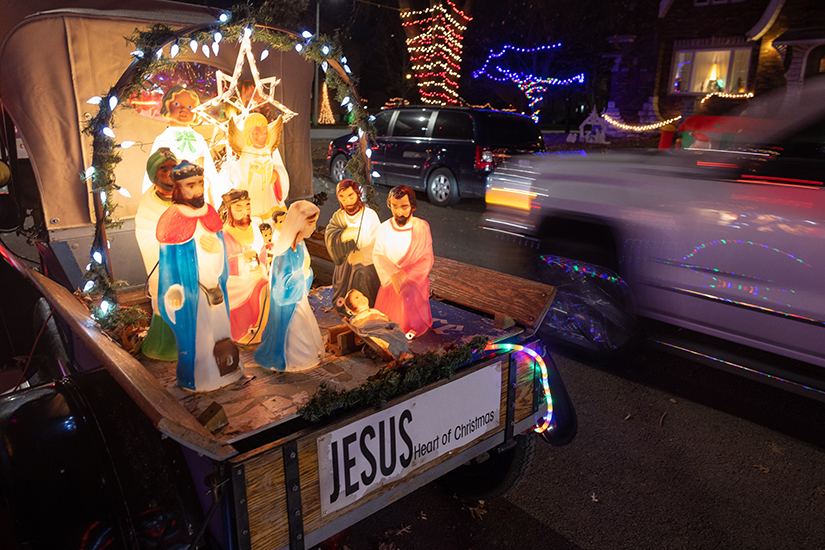‘The incredible gift of the Incarnation’

Full Christmas season, lasting until Jan. 8, offers greater revelation of who Jesus is and why He has come
While Christmas music might disappear from radio stations on Dec. 26, the Catholic Church invites you to keep the party going until Jan. 8.
That’s because the Church marks not just the solemnity of the Nativity of Our Lord Jesus Christ on Dec. 25 but an eight-day octave and the entire liturgical season of Christmas.

“The Church has always found that, for the big feast days, one day is not enough,” said Father Don Anstoetter, director of worship and assistant professor of sacramental-liturgical theology at Kenrick Glennon Seminary. “So the celebration of Easter and Christmas spills out into the days following, and she gives us eight full days to celebrate the Christmas octave, where each day we look at different aspects of the mystery of Christmas.”
A season of revelation
The Christmas season begins with vigil Masses on Christmas Eve. It ends on the feast of the Baptism of the Lord, celebrated this year on Monday, Jan. 8. The first eight days make up the Octave of Christmas, where each day is a solemnity — basically equivalent to a Sunday.
The season also includes the feast of the Epiphany, which has been traditionally celebrated on Jan. 6 — the 12th day of Christmas — but in the U.S. is now moved to the Sunday between Jan. 2 and Jan. 8. (This year, the feast is Sunday, Jan. 7.)
Through the readings and feast days, “There’s an outward move throughout the Christmas season … that leads to the greater revelation of who Jesus is and why He has come,” Father Anstoetter said.
After Jesus’ birth, we hear how He was revealed to the Wise Men as they paid Him homage on the Epiphany. On the feast of the Lord’s baptism, John the Baptist declares Jesus the Messiah, and He is made known through the Holy Spirit’s descent.
Although Jesus was baptized 30 years after His birth, it’s a fitting feast to end the Christmas season, Father Anstoetter said.
“There’s a shift that happens with the baptism, as we go from Jesus’ private life with the Holy Family in Nazareth to His public ministry,” Father Anstoetter said. “The baptism is the turning point that marks that transition in His own life, so it makes sense that for the liturgical calendar, it marks the transition from the Christmas season back to Ordinary Time.”
The Church also celebrates these feast days during the octave:
Dec. 26: St. Stephen, martyr
It may seem strange to go from celebrating the birth of Jesus on Dec. 25 to celebrating the saint often recognized as the first martyr, St. Stephen, the next day. “Yet it makes clear that the reason why Jesus is born, the reason why He becomes man, is so He can suffer and die for us and rise from the dead,” Father Anstoetter said. “St. Stephen imitates Jesus and, in a way, shows the fulfillment of Christmas.”
Dec. 27: St. John, apostle and evangelist
St. John was especially close to Jesus and authored one of the four Gospels. “He writes so beautifully about the Incarnation. It’s from Him that we received the words, ‘And the Word was made flesh and dwelt among us,’” Father Anstoetter said.
Dec. 28: Holy Innocents, martyrs
The Gospel of Matthew recounts that after Jesus’ birth, King Herod “ordered the massacre of all the boys in Bethlehem and its vicinity who were 2 years old and under, in accordance with the time he had ascertained from the Magi” (Matthew 2:16), hoping to eliminate the threat of a new ruler. “This is such a difficult mystery for us to receive,” Father Anstoetter said. “But we know that because Jesus has become man because He suffered and died for us, He has opened the gates of heaven to those Holy Innocents.”
Sunday after Christmas (Dec. 31 this year): Feast of the Holy Family
This feast honors Jesus, Mary and St. Joseph as a model for all families. Jesus chose to be born into and grow up with a simple, humble family, showing us how our own family can be a “domestic church” to foster faith and share God’s love.
Jan. 1: Mary, Mother of God
The octave concludes with the solemnity of Mary, the Mother of God. “Since we begin with the birth of Jesus, we celebrate on the eighth day His mother,” Father Anstoetter said.
While this feast is typically a holy day of obligation, since the feast falls on a Monday this year, the U.S. bishops have released the faithful from the obligation to attend Mass on Jan. 1.
Celebrating all season long
Our culture often struggles to keep the seasons of Advent and Christmas in their proper places, leading to Christmas burnout by the time the day finally comes. By leaning into the Church’s liturgical seasons, we can reserve the Advent season as a time of interior preparation for the coming of Jesus at Christmas and also at the end of time, Father Anstoetter said. Then, the Christmas season is our time to celebrate that Jesus has indeed come.
“We need both of those aspects — the anticipation, then the celebration,” he said.
One simple way to continue the celebration of Christmas throughout the liturgical season is to keep reminders of Christmas alive in our homes, Father Anstoetter said. “To keep the nativity set up and make it not just a decoration, but a focus for prayer during the Christmas season can be such a reminder for the family to remember the Holy Family, to remember what life was like for them when Jesus was first born — to remember that, just as we have struggles and joys and worries and things to be grateful for, the Holy Family had struggles and joys and worries and things to be grateful for.”
Father Anstoetter also encourages participating in the liturgies of the entire Christmas season — certainly on Sundays, but also other days whenever possible. “Every day is a feast during the octave, so any days you can make it to Mass or pray the Liturgy of the Hours, those are great ways to remember the Christmas season,” he said.
In sum: The entire liturgical season of Christmas is the gift that keeps on giving.
“It helps us keep our priorities straight, focused on Jesus and recognizing the incredible gift of the Incarnation — that because Jesus has become one of us, because He has come among us as a child, we have every reason for hope and confidence in our own spiritual life,” Father Anstoetter said.
While Christmas music might disappear from radio stations on Dec. 26, the Catholic Church invites you to keep the party going until Jan. 8. That’s because the Church marks not … ‘The incredible gift of the Incarnation’
Subscribe to Read All St. Louis Review Stories
All readers receive 5 stories to read free per month. After that, readers will need to be logged in.
If you are currently receive the St. Louis Review at your home or office, please send your name and address (and subscriber id if you know it) to subscriptions@stlouisreview.com to get your login information.
If you are not currently a subscriber to the St. Louis Review, please contact subscriptions@stlouisreview.com for information on how to subscribe.





